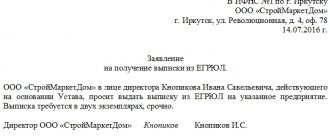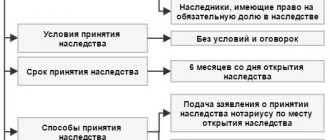Grounds for issuance and registration procedure
A certificate of the right to inheritance, obtained both by law and on the basis of a will, is a document confirming the transfer of inherited property, including bank deposits, land, pensions, scholarships from the deceased owner to his relatives and close people. In addition to the transfer of the inheritance to the heir, the document confirms the latter’s consent to accept it, since in the event of refusal of the inheritance or its non-acceptance, there are no grounds for issuing a certificate. The fact of acceptance of the inheritance is important when issuing a certificate.
The issuance of a certificate of the right to inheritance is carried out if there are legal grounds and in the form prescribed by law. According to civil law, property owned by citizens (apartments, houses, pensions, cars, money), as well as their property rights, for example, the right to lease a plot of land, after their death are transferred to their heirs by law, taking into account the rules of order of succession. The same rule applies to the inheritance of deposits, scholarships and land.
At the same time, the Civil Code of the Russian Federation guarantees the right of a person to make a will, by which he can express his will regarding the further disposal of property.
There are two categories of heirs (by law and by will) and, accordingly, two categories of grounds for their entry into inheritance and receipt of a certificate of the right to inherit.
To be able to dispose of property, both categories of heirs must enter data on the received certificate into the state register, having previously paid the state duty (tax), which is also of no small importance. The amount of state duty (tax) for issuing a certificate is established by tax legislation.
A certificate of the right to inheritance under a will, as well as a corresponding document confirming the rights of heirs under the law, is issued in writing by a notary at the place of opening of the inheritance. According to the law, this is the last registered place of residence of the testator. If there is no information about the last place of residence of the deceased, all notarial actions regarding the disposal of his property are carried out at the location of the majority of the inheritance mass.
Terms of issue
The certificate is necessary for any heir (testamentary or legal: next or extraordinary) to prove his right to the inherited property in the event of a controversial situation. The release of a document within the established time frame confirms the fact of transfer of rights for a claim to inheritance (not to be confused with the actual rights to property for a specific property, issued at other times and on other grounds).
An inheritance case is opened after an application by one of the heirs and is accompanied by the writing of a statement from the latter about the accepted inheritance in a mandatory manner. Next, the notary checks all the information (on the will and, possibly, on the previously opened case) and fills out the corresponding certificate of rights.
You should contact the notary at the place where the case was opened. Basically, this is the last place of residence of the deceased - the address of permanent or prerogative residence. It can be established by registration information or in court. If it is impossible to establish the exact address, the opening is carried out in accordance with the location of the inheritance.
Features and conditions for issuing a certificate to heirs by law
To obtain a certificate of right to inheritance, according to the law, heirs are required to provide the notary’s office with the necessary documents confirming the following facts:
- time and place of opening of the inheritance. This information contains the death certificate of the testator;
- the presence of family ties between the deceased and the person applying for inheritance (copy of birth certificate, copy of marriage certificate, copies of judicial acts confirming adoption, recognition of paternity, etc.). Persons who have not provided originals or copies of documents certifying the presence of both blood and marital ties with the testator will be able to inherit only with the consent of the remaining heirs. Also, as confirmation of family ties, you can use certificates indicating marriage or blood ties, which officials at the place of work or residence of the interested persons have the authority to issue;
- the location of objects from the hereditary mass (real estate, car, money) and its composition. To do this, you must submit title documents for the property and property rights of the deceased (documents confirming ownership of apartments and houses, the availability of money in the form of bank deposits, a land lease agreement, confirmation of copyright);
- passport and identification number of the applicant.
If the above documents are available, which are the basis for issuing a certificate, the applicant has the right to receive the document six months after the death of the testator and enter data about it into the state register.
Required documents
The submitted appeal must not be unfounded. In order to substantiate his rights to the inheritance of the deceased’s possessions, the successor must, in addition to the application for accession, provide the following papers:
- death certificate (issued by the civil registry office);
- heir's identity card;
- basis for inheritance (will, documents on birth, marriage, divorce, change of surname, etc.);
- any of the documents confirming the testator’s rights to own property (sample of the Unified State Register of Real Estate, registration data);
- approved value of the property (appraisal report, cadastral papers).
We recommend reading: Inheritance agreement
Depending on the specific inheritance case, other documents may be required.
How to obtain a certificate of inheritance under a will
The issuance of a certificate of the right to inheritance under a will is carried out on the basis of the following documents:
- death certificate of the owner of property and property rights, as well as copyrights, who made a will in favor of the applicant;
- directly the will itself, drawn up in accordance with the form established by law;
- date of death of the testator;
- place of opening of inheritance;
- a list of objects included in the estate: real estate (houses, apartments, land), movable property (the testator owns a car, civilian and hunting weapons), property rights (deposits, pensions, scholarships). If there is a transfer of the right to lease a land plot, it is necessary to provide information about the lease agreement, in particular about its validity period. The transfer of copyright to the heirs of the testator is carried out in accordance with the rules of inheritance, and recording of this fact in the state register is not required;
- passport and identification number of the applicant.
Having received the above documents from applicants for bequeathed property, the notary proceeds to establish the circle of persons who are entitled to an obligatory part in the inheritance. In the absence of such, the heirs will be able to receive bequeathed property in the amount specified in the will, as well as a certificate of the right to inheritance under the will 6 months after the death of the person who made it.
Do you need the help of an inheritance lawyer?
We will advise you on all your questions!
+7
State fee for issuing a certificate
When issuing a certificate of inheritance rights on the basis of Art. 333.24 of the Tax Code of the Russian Federation provides for a state duty for carrying out notarial actions. According to paragraph 22 of the article, when inheriting by law or will, a duty of 0.3% of the value of the property is collected from the children, parents, spouse of the testator, as well as his full brothers/sisters (but not more than 100 thousand rubles ). The remaining heirs will have to pay 0.6%, but not more than 1 million rubles.
The adoption of measures to protect the inheritance is paid, it costs 600 rubles. (clause 23 of article 333.24 of the Tax Code of the Russian Federation).
Additionally, notarial acts . Each heir must pay it (by law, will, compulsory share).
However, there are tax benefits According to paragraph 5 of Art. 333.38 of the Tax Code of the Russian Federation, individuals who inherit a house and a plot under it, an apartment, a room or a share in a residential premises are exempt from it, but only if these persons lived with the testator before his death. State duty is not paid by individuals when inheriting bank deposits or insurance amounts. The fee is never charged to minor heirs, and disabled people have a permanent 50% discount.
The technical work of the notary and the development of the draft certificate must be paid
Features of state registration of ownership of inheritance
However, in order to become the full owner of inherited property, it is necessary to go through the procedure of state registration of the received certificate of inheritance with the authorized bodies:
- registration of ownership of apartments and houses is carried out by employees of the Federal Registration Service, who enter data on the transfer of ownership into the register. You should also contact here to register and enter into the register information about the heir’s receipt of the right to land;
- vehicle registration is carried out at the traffic police by entering data into the register;
- As for weapons, registration of ownership of them as acquired by inheritance is not required. However, you will still have to obtain permission to use and own such an object of inheritance. The exception is short-barreled and combat types of weapons. According to the law, such types of weapons after the death of the testator are subject to voluntary surrender to the regional police authorities;
- Registration of copyrights received by inheritance is not provided for by law. The concept of copyright should not be confused with the right to the result of intellectual property, since in the first case the heir does not receive any financial benefit, only the opportunity to publish the contents of the deceased’s works under his own name;
- If the deceased has funds in the form of a monetary contribution, the heirs will be able to receive them in full only after receiving a certificate of the right to inheritance and in accordance with the order of the testator regarding the contributions. It should be noted that the relatives of the deceased can receive part of the funds from the bank deposit earlier than the established period if the funds are needed for the funeral of the owner of the deposits. The basis for the issuance of funds is the corresponding decree of the notary.
A sample certificate of inheritance can be obtained from a notary office. As a rule, the content of the sample includes the following data:
- time and date of issue;
- where and by whom it was issued (address of the notary’s office, full name of the notary who compiled and certified the document);
- personal data about the person in whose favor the document was drawn up;
- information about the testator;
- date of opening of inheritance;
- information about the inherited property and the size of the recipient’s share of the certificate in it. This should include information about real estate objects (apartments, houses), which, according to the issued certificate, become the property right of its recipient, as well as, if any, about movable property and property rights, such as the right to lease a land plot, the right to receive deposits, pensions, scholarships and other funds of the deceased. The transfer to the recipient of the copyright certificate is also recorded in the text of the document;
- the cost of part of the inheritance mass, the right to dispose of which is acquired by the person who received the certificate (the cost of an apartment, the cost of a car, the cost of a land plot, etc.).
What documents are needed for registration?
After opening a probate case, certain documents are collected. You can divide the required papers into those that are required for inheriting any property, and those that are necessary only for a specific type of inheritance.
What documents need to be prepared to register an inheritance with a notary after the death of the testator? General package of papers:
- a document certifying the death of the testator. Only the original is required. You can get it at the registry office.
- Applicant's passport.
- Application for opening a case for inheritance. It will vary depending on the method of inheritance: by law or by will.
- A certificate from the place of residence of the testator to determine the place of opening of the inheritance.
- Documents evidencing family ties. Required both for inheritance by law and for receiving property under a will. If there is a close relationship, the state duty will be significantly lower when receiving a certificate of inheritance.
- Will, if available.
- Valuation of inherited property on the day of death. Establishment of value is required to carry out various calculations.
- Refusal of heirs, if any. Please note that the refusal must be notarized. You can only refuse the entire inheritance due; refusal of a part is impossible. Read about how to draw up a waiver of inheritance in favor of another heir here.
Inheriting an apartment
Additional papers are required and provided to the notary:
- a certificate of all those registered in the inherited apartment or the absence thereof;
- certificate of ownership of the apartment;
- cadastral and technical passport, which can be obtained from the Unified State Register of Real Estate and the BTI by writing a request and paying a state fee of 200 rubles;
- certificate of absence of debts for housing and communal services.
Private house
It is necessary to provide not only paper related to the building itself, but also to the site on which it is located:
- certificate of ownership of the house, which must be registered in the Unified State Register of Real Estate. If you do not have it on hand, you can obtain a duplicate upon request.
- Papers certifying the rights to own a house: purchase and sale agreement, donation, transfer of the house by will to the deceased.
- Technical passport for the inherited building, which can be issued in the Unified State Register of Real Estate.
- Documents for ownership of the land plot where the house is located: ownership or lease agreement.
- Cadastral passport for a land plot.
- Certificate of appraised value of a plot of land.
Car
Car inheritance involves collecting all documents related to the registration of a car:
- PTS – vehicle passport. Only the original document is required; a notarized copy can be provided;
- STS – vehicle registration certificate;
- Documents confirming the repayment of all fines for the car.
It should be remembered that if there was a power of attorney to drive a car, then after the death of the owner of the vehicle it is considered invalid. Only when all documents are reissued to the new owner will it be possible to use the vehicle. This will happen no earlier than six months after the opening of the inheritance case.
Valuable papers
Securities include shares, bills, certificates, bonds. Inheritance of securities requires the provision of the following documents:
- extract from the register of a joint stock company;
- certificate of valuation of shares.
When issuing a certificate for securities, the state duty is calculated based on the assessed value, but not lower than the nominal price.
Bank deposit
It has the following feature: if the heirs do not know about the existence of an open account in the bank, then bank employees are not obliged to inform them about it. You can find out about the intended contribution by submitting an official request through a notary. If the heir knows about the account, then it is required to provide the available bank documents:
- banking agreement.
- Passbook or plastic card.
The heir has the right to withdraw an amount of 40 thousand rubles for organizing a funeral without waiting to receive the inheritance certificate.
Copyright
Copyright, once registered, can be inherited, but in this case there is a limitation period, which is 70 years of ownership of copyright from January 1 of the year following the date of death of the author. During inheritance, the authorship itself does not change; the heir will have the opportunity to distribute and replicate the products of intellectual work. A document confirming authorship is required - a patent or a document from the Union of Writers and Artists.
Weapons
For certain types of weapons there is a prohibition on passing them on as an inheritance. When inheriting a weapon, it is necessary to distinguish between the right to own it and the right to use it. Before receiving all the papers, the weapon must be transferred for safekeeping to the Ministry of Internal Affairs. To obtain a certificate of inheritance of weapons, you must provide the notary with:
- weapon passport;
- storage permission.
If it is impossible to independently handle inheritance issues, you can entrust this to a trusted person, for whom a special document is required (Article 1153 of the Civil Code of the Russian Federation). This person could be a relative or friend, or a lawyer. The power of attorney is issued on the basis of the following documents:
- passport of the principal and authorized representative;
- death certificate.
The text of the document indicates the powers vested in the trustee.
Procedure for issuing a certificate of inheritance
Requirements for registration and issuance of documents, features of the procedure
- a certificate of the right to inheritance is issued at the place of residence of the testator;
- the document must be in writing and notarized. Oral form is not acceptable;
- Errors and inaccuracies in the text of the document are not allowed. If there are errors in the information about the recipient of the certificate or in the information about the inherited property (incorrect indication of the amount of the testator's monetary contribution, his pension, errors in the details of the agreement confirming the right to lease a land plot and other shortcomings), the validity of the document can be challenged in court by the claim of interested parties ;
- the document is issued to the heirs by law or by will after six months from the opening of the inheritance;
- in case of loss of the certificate, the notary issues a duplicate;
- the certificate must contain adequate information about the property;
- the document is issued at the request of interested parties;
- at the request of the heirs, one document may be issued listing the shares of each heir and indicating which objects were transferred to which of them, or several - for each heir separately.
Deadlines for issuing a certificate
The law does not actually limit the time when heirs can receive a certificate of inheritance. They can come to their senses 10-20 years after the opening of the inheritance, but they must prove that during this time they accepted the property .
It is very important that the heirs have time to submit an application for the issuance of a certificate before the end of the six-month period from the death of the testator (Article 1153 of the Civil Code of the Russian Federation). The basis for the belated issuance of a document through the court will also be the actual acceptance of the inheritance during this period (Article 1154 of the Civil Code of the Russian Federation).
If one of the heirs did not manage to apply for a certificate on time, it may also be included in the document. But under two conditions: if the certificate has not yet been issued and other successors give written consent (Article 71 of the “Legislation on Notaries”, No. 4462-1 as amended on December 29, 2014).
The norm of paragraph 1 of Art. 1163 of the Civil Code of the Russian Federation states that in most cases the certificate can be handed over to the heirs at any time, but after the expiration of a six-month period from the moment he acquires rights to the inherited property. 6 months are given so that all potential successors have time to declare themselves to the notary.
If it is precisely and reliably known that there are no and will not be other heirs besides those who have already applied, the certificate may be issued earlier (clause 2 of Article 1163 of the Civil Code of the Russian Federation).
The term can be postponed by court decision, by default if there is a nulliparous heir (clause 3 of Article 1163 of the Civil Code of the Russian Federation). An increase in the deadline for accepting an inheritance is provided for successors who received their rights as a result of the refusal of other heirs (clauses 2-3 of Article 1154 of the Civil Code of the Russian Federation). For them, the issuance of a certificate may be postponed.
Example Each of the heirs received a notarized certificate of the right to inherit the house and the land underneath it in June 2002. However, none of the documents were included in Rosreestr, and certificates of state registration of rights have not yet been received. Despite the fact that more than ten years have passed, each of the heirs can apply for a document on state registration of rights in relation to the house with a plot. After all, a certificate of inheritance does not have an expiration date; it is indefinite. Each of them will need to pay a fee applicable on the day of application. In 2014 it was 1000 rubles, in 2015 it doubled and may change from year to year.
Validity period of the certificate of inheritance
The validity of the certificate of the right to inheritance is not limited by any period; the heir who received the document has the right to register his rights at any time convenient for him. However, it should be remembered that the lack of state registration limits the rights of the heir and deprives him of the opportunity to dispose of the received property. To receive the property of a deceased owner (apartments, cars, land) into ownership, it is necessary to register a certificate of inheritance with the relevant authority.
As for property rights, namely the right to receive money, pensions, stipends of the testator, the right to lease a land plot, as well as property the right to inherit which is not subject to registration (weapons), they can be used and disposed of after 6 months from the date of opening of the inheritance .
If you lose the certificate confirming your entry into inheritance, you must contact a notary for a duplicate.
Is it possible to challenge the legality of a certificate of the right to inheritance in court?
In order to challenge a certificate of non-inheritance in court, it is necessary to establish and prove the existence of reasons confirming its invalidity. The availability of documentary evidence is of great importance during a dispute.
A certificate of the right to inheritance can be invalidated through a court on the following grounds:
- the presence in the document of errors and unreliable information about the property and funds of the deceased person (pension, scholarship, cash contribution);
- if the certificate confirms the transfer of rights to an apartment, car or land that is common joint property;
- non-compliance of the document with the established form, lack of notarization;
- the person who received the document had no rights to the inherited property. A complete list of such persons is established by the Civil Code of the Russian Federation;
- if the appeal of the certificate was preceded by the invalidation of the will through the court.
Recognition of a certificate of inheritance as invalid with the subsequent application of all the consequences of invalidity is possible only through a court located at the place of residence of the defendant. In relation to appealing a certificate, the general limitation periods apply.
Grounds for cancellation of a document
A notary has the right to annul or cancel a certificate issued by him without going to court under the following conditions:
- the presence in the document of errors regarding the property (real estate, vehicles, weapons) and means of the deceased, clerical errors;
- The consent of the heirs to perform this notarial act is of great importance. Consent must be in written form only.
After canceling the certificate of inheritance, the notary must make a corresponding decision, on the basis of which he will subsequently make a new sample of the document.
Conditions for restoring the certificate, obtaining a duplicate
If the certificate of inheritance is lost or damaged, the notary who issued the document restores it and issues a duplicate that looks identical to the original source. A duplicate can be issued by one of the heirs in whose name the certificate of the right to inheritance, which is subject to restoration, was issued.
The basis for restoring a document is a corresponding statement on behalf of the person who lost it. All you need to do is apply for a duplicate and pay the tax.









